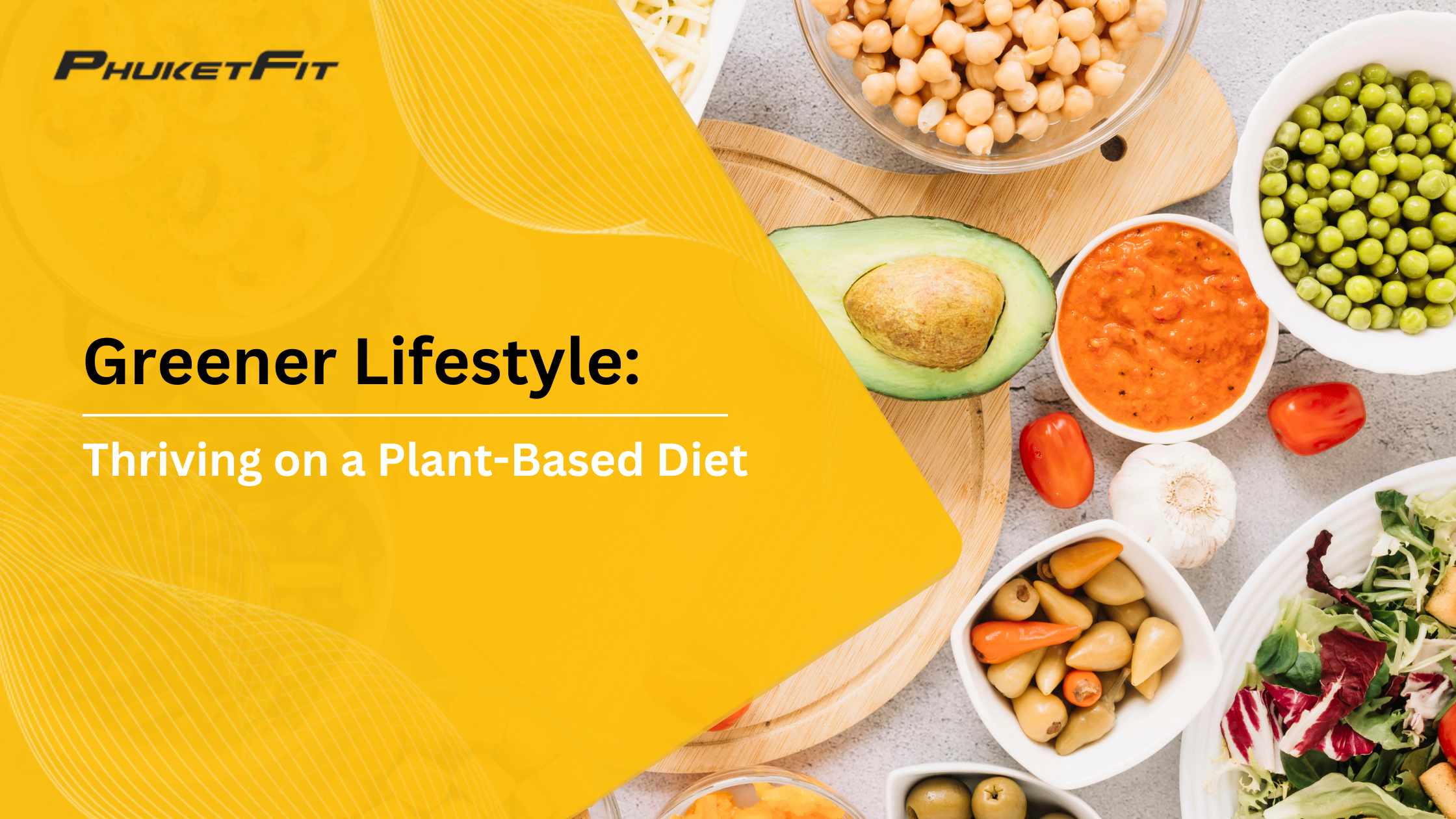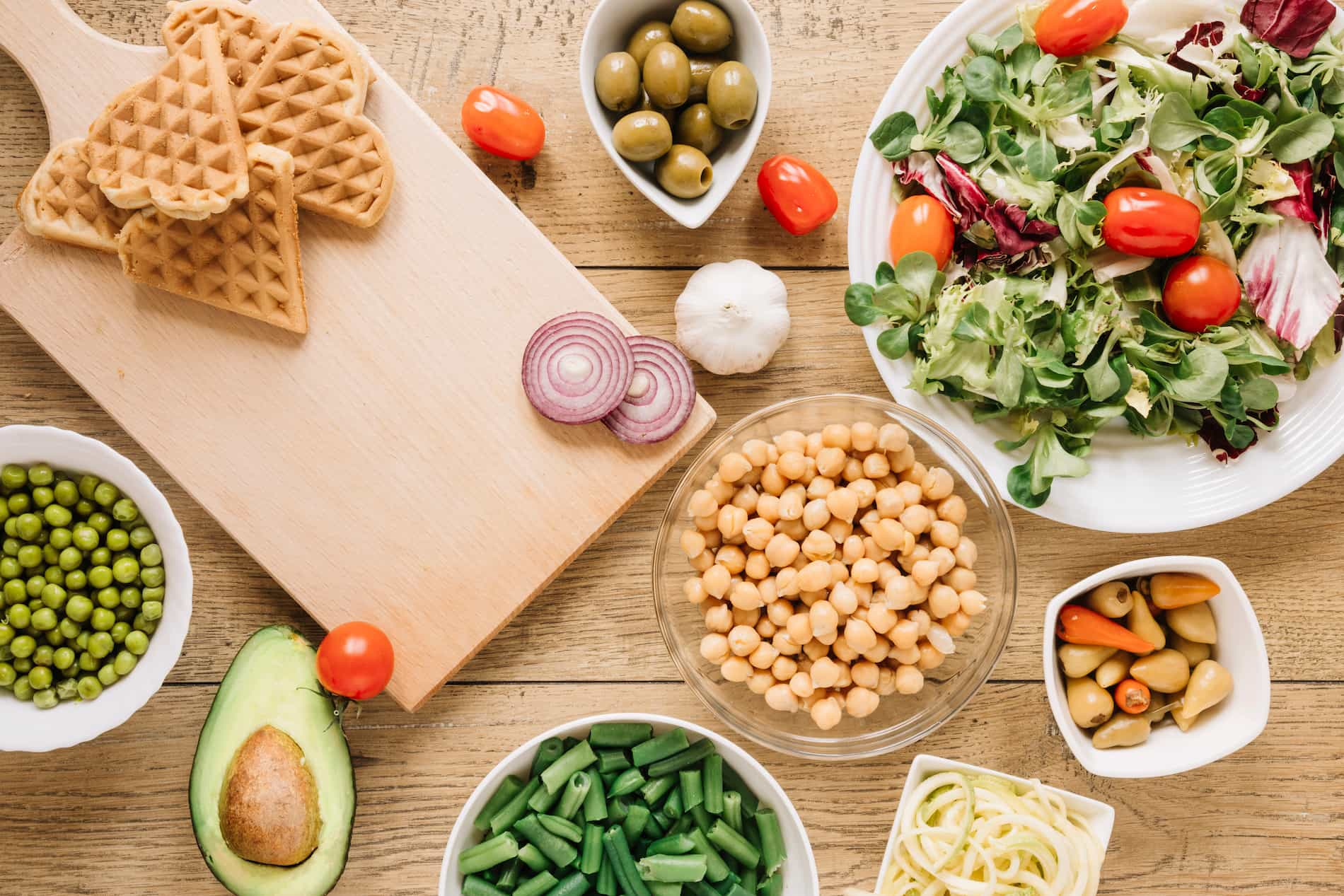
Thriving on a Plant-Based Diet
Are you curious about how switching to plant-based meals can improve your health and help the planet? Join us on an enlightening journey as we explore the many facets of a plant-based diet. This approach focuses on foods derived from plants and offers numerous wellness benefits. We’ll delve into different types of plant-based diets, such as veganism and vegetarianism, each with its unique principles. By comparing these diets to other eating patterns, you’ll gain a comprehensive understanding of their benefits and why a plant-based table might be the nourishing change you’re looking for. Let’s cultivate knowledge and well-being together with the help of PhuketFit.
Health Benefits of Plant-Based Diets

Adopting a plant-based diet is synonymous with nurturing your health and well-being. These diets, rich in nutrients, low in saturated fats, and high in fiber, are transforming lives every day. Let’s take a closer look at the health benefits of plant-based eating.
Boosting Health with Fresh Fruits and Vegetables
Fresh fruits and vegetables are the cornerstone of a plant-based diet. Packed with vitamins, minerals, and antioxidants, they boost your immune system and help maintain optimal health. Regular consumption can lead to better digestion, healthier skin, and increased energy levels, potentially revolutionizing your daily wellness. A study by Lee-Kwan et al. found that only 12.3% of adults in the U.S. meet the recommended fruit intake, and only 9.3% meet the vegetable intake. At PhuketFit, our meal plans are designed to incorporate a variety of fresh fruits and vegetables to ensure you meet your daily nutritional needs.
Preventing Chronic Diseases with Plant-Based Diets
The power of plant-based foods in preventing diseases is well-documented. Tuso et al. found that a diet rich in plant-based foods can significantly reduce the risk of chronic conditions like heart disease, diabetes, and certain cancers. For instance, heart disease is the leading cause of death globally, accounting for approximately 17.9 million lives each year (WHO). Whole grains, nuts, seeds, and legumes can help manage cholesterol levels and improve blood pressure, enhancing cardiovascular health. At PhuketFit, our wellness programs are tailored to help you incorporate these beneficial foods into your diet to prevent chronic diseases and improve overall health.
Improving Gut Health
Our gut health is closely linked to our overall health, mood, and immune response. Albenberg & Wu noted that a plant-based diet is rich in fiber, essential for maintaining a healthy gut microbiota. This not only aids in digestion but also promotes beneficial bacteria that fight inflammation, improve nutrient absorption, and strengthen the gut barrier. At PhuketFit, our nutritionists can help you design a diet rich in fiber to support your gut health.
- Diverse Microbiome: Fruits and vegetables promote a diverse and healthy microbiome.
- Digestive Health: Fiber from plants keeps the digestive system clean and regular.
- Weight Management: Slavin (2013) found that legumes and whole grains can improve gut peptide response, which impacts satiety and helps manage weight.
Integrating more plants into your meals might be the best investment you can make for your long-term health and vitality, and PhuketFit is here to support you every step of the way.
Plant-Based Diets for Whole-Body Wellness

Achieving optimal health requires a comprehensive approach to nourishment. Embracing a plant-based diet can be the cornerstone of your quest for whole-body wellness, and PhuketFit offers fitness programs to support this journey.
Weight Management
One of the most noticeable benefits of a plant-based diet is its effectiveness in weight management. Jenkins et al. found that fiber-rich plants contribute to a feeling of fullness, reducing the likelihood of overeating. High-fiber foods also help regulate blood sugar levels, keeping your energy steady and appetite in check. Tonstad et al. noted in a review in “The American Journal of Clinical Nutrition” that individuals following a vegetarian diet had a mean BMI approximately 1-2 points lower than those who consumed meat. At PhuketFit, our weight management programs are designed to help you achieve and maintain a healthy weight through a balanced plant-based diet.
Meeting Nutrient Requirements
A well-balanced plant-based diet is abundant in essential nutrients. Lampe (1999) highlighted that leafy greens, colorful fruits, and hearty vegetables are rich in vitamins and minerals necessary for the body’s functions. These nutritious powerhouses also offer a diverse range of antioxidants, which combat oxidative stress and inflammation, paving the way for long-term health and disease prevention. PhuketFit ensures that your diet includes a variety of these nutrient-rich foods, explore our menu here.
The Role of Supplements
While plants can provide a vast spectrum of essential nutrients, Melina et al. noted that some nutrients like vitamin B12, omega-3 fatty acids, iron, and vitamin D are less commonly found in plant foods. Supplements can play a supportive role in filling these dietary gaps. Consulting with a healthcare provider can help ensure your plant-based diet meets all your nutritional needs. At PhuketFit, we can help you identify and incorporate the right supplements into your diet.
Protein Power: Plant-Based Protein Sources

One common concern about a plant-based diet is whether it provides adequate protein. Craig (2009) observed that plants can offer ample protein, often with fewer calories and less fat than animal counterparts. Understanding the amino acid profile and combining different plant sources can ensure you receive complete protein. The National Academies (2005) found that the Recommended Dietary Allowance (RDA) for protein is 46 grams per day for women and 56 grams per day for men. PhuketFit offers guidance on how to meet your protein needs with a plant-based diet.
Plant Protein Sources
- Lentils and Beans: Rich in protein, fiber, iron, and complex carbohydrates.
- Nuts and Seeds: High in protein and healthy fats, great for snacks or smoothies.
- Whole Grains: Quinoa and bulgur offer protein and essential B vitamins.
- Soy Products: Tofu, tempeh, and edamame are versatile and protein-rich.
- Green Vegetables: Spinach, broccoli, and kale add to your daily protein intake and come packed with other nutrients.
Plant-Based Meat Alternatives: OmniMeat and Beyond Meat
As more people adopt plant-based diets, innovative meat alternatives like OmniMeat and Beyond Meat have emerged, offering tasty and nutritious options.
- OmniMeat: A versatile plant-based meat substitute made from pea protein, non-GMO soy, shiitake mushrooms, and rice. It mimics the texture and flavor of ground meat, making it ideal for a variety of dishes, from stir-fries to burgers. OmniMeat is not only high in protein but also low in saturated fat, making it a healthy alternative to traditional meat.
- Beyond Meat: Known for its realistic taste and texture, Beyond Meat products are made from a blend of pea protein, mung bean protein, and rice protein. Sabaté & Wien (2010) observed that Beyond Meat offers burgers, sausages, and meatballs that sizzle and satisfy just like animal meat. These products are free from GMOs, soy, and gluten, catering to a wide range of dietary needs while providing ample protein and essential nutrients. PhuketFit includes these meat alternatives in our meal plans to make your plant-based transition easier and more delicious.
Plant-Based Diets and Athletic Performance
Athletes worldwide are turning to plant-based diets to enhance performance, reduce recovery times, and improve overall health. Nieman (1999) observed that plant proteins can satisfy the energy and recovery needs of high-performance athletes.
From Kitchen to Table: Meal Planning

Embarking on a plant-based diet involves a holistic approach to meals, from shopping to cooking to sharing food with family and friends. Let’s explore how to seamlessly integrate plant-based options into your lifestyle.
Cooking and Meal Planning
Mastering plant-based cooking involves understanding the staples of a meatless meal. Stock your pantry with legumes, whole grains, nuts, seeds, and a variety of spices. Meal prep can be relaxed and enjoyable: think big batches of quinoa, roasted vegetables, or homemade hummus to mix and match throughout the week.
Grocery Shopping Tips
When grocery shopping, have a plan. Make a list based on your meals for the week, and include a variety of fruits, vegetables, and whole grains. Buy seasonal and local produce to ensure freshness and minimize your carbon footprint. Bulk-buying staples like lentils, beans, and nuts saves money and reduces packaging waste.
Starting Your Plant-Based Journey
Embracing a plant-based diet can be an exciting and rewarding step toward better health and environmental stewardship. However, the journey involves adapting to a new way of eating and living. Here are some tips to help you transition smoothly.
Tips for Transitioning
- Do Your Research: Learn about essential nutrients and find plant-based sources for them.
- Start Slow: Gradually replace animal products with plant-based alternatives.
- Seek Support: Join online communities, follow plant-based blogs, or connect with local groups.
Real-Life Success Stories
Finding inspiration from others can bolster your confidence as you embark on your plant-based journey. Numerous success stories highlight profound changes in health and well-being after switching to a plant-based diet.
Sustaining Your Plant-Based Lifestyle
Sustainability is key to any lifestyle change. Keep your meals varied and exciting by experimenting with new recipes and ingredients. Stay informed about the latest nutrition research to ensure your diet remains balanced and fulfilling.
Adopting a plant-based diet offers numerous health benefits, from improved cardiovascular health to better digestion and weight management. With careful planning and a wealth of delicious options, you can enjoy a nutritious, satisfying diet that supports your well-being and the planet.
References
- Albenberg & Wu, 2014: Albenberg, L. G., & Wu, G. D. (2014). Diet and the Intestinal Microbiome: Associations, Functions, and Implications for Health and Disease. Gastroenterology, 146(6), 1564–1572.
- Craig, 2009: Craig, W. J. (2009). Health effects of vegan diets. The American Journal of Clinical Nutrition, 89(5), 1627S-1633S.
- Jenkins et al., 2003: Jenkins, D. J., Kendall, C. W., Marchie, A., Jenkins, A. L., Augustin, L. S., Ludwig, D. S., … & Anderson, J. W. (2003). Type 2 diabetes and the vegetarian diet. The American Journal of Clinical Nutrition, 76(1), 266S-273S.
- Lampe, 1999: Lampe, J. W. (1999). Health effects of vegetables and fruit: assessing mechanisms of action in human experimental studies. The Journal of Nutrition, 129(3), 758S-761S.
- Lee-Kwan et al., 2017: Lee-Kwan, S. H., Moore, L. V., Blanck, H. M., Harris, D. M., & Galuska, D. (2017). Disparities in state-specific adult fruit and vegetable consumption—United States, 2015. MMWR. Morbidity and Mortality Weekly Report, 66(24), 1241.
- Melina et al., 2016: Melina, V., Craig, W., & Levin, S. (2016). Position of the Academy of Nutrition and Dietetics: vegetarian diets. Journal of the Academy of Nutrition and Dietetics, 116(12), 1970-1980.
- Nieman, 1999: Nieman, D. C. (1999). Physical fitness and vegetarian diets: is there a relation?. The American Journal of Clinical Nutrition, 70(6), 1051S-1055S.
- Slavin, 2013: Slavin, J. L. (2013). Fiber and prebiotics: mechanisms and health benefits. Nutrients, 5(4), 1417-1435.
- Sabaté & Wien, 2010: Sabaté, J., & Wien, M. (2010). Vegetarian diets and childhood obesity prevention. The American Journal of Clinical Nutrition, 91(5), 1525S-1529S.
- Tonstad et al., 2009: Tonstad, S., Butler, T., Yan, R., & Fraser, G. E. (2009). Type of vegetarian diet, body weight, and prevalence of type 2 diabetes. Diabetes Care, 32(5), 791-796.
- Tuso et al., 2013: Tuso, P. J., Ismail, M. H., Ha, B. P., & Bartolotto, C. (2013). Nutritional update for physicians: plant-based diets. The Permanente Journal, 17(2), 61.
- WHO, 2021: World Health Organization. (2021). Cardiovascular diseases (CVDs).
This comprehensive guide showcases the transformative power of a plant-based diet on your health and well-being, along with practical tips to help you transition smoothly. With the support of PhuketFit, you can embark on this journey with confidence, knowing you have the tools and knowledge to thrive.

Chain - Fitness, Mobility & Stability Coach
Chain, a Certified Personal Trainer and Fitness Coach at PhuketFit, brings a wealth of knowledge with qualifications in Mobility, Stability, and HIIT training. His innovative and accessible approach to fitness, coupled with his expertise in functional movement, makes him a trusted voice in the health and fitness community. Fluent in Thai, English, and German, Chain's writing encapsulates his passion for empowering individuals to achieve long-term wellness through enjoyable and sustainable fitness and weight loss practices.